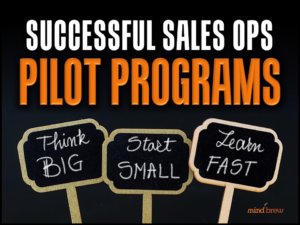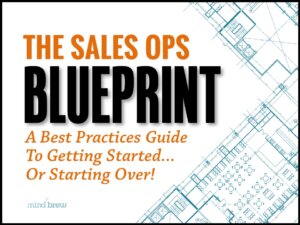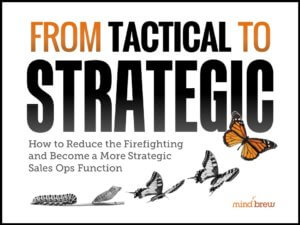In his novel Ulysses, James Joyce wrote, “A man of genius makes no mistakes. His errors are volitional and are the portals of discovery.” While we’re fairly certain that Joyce was not thinking about Sales Ops when he wrote these sentences (although Ulysses covers so much ground it might be possible), it nevertheless still applies.
In all professional arenas, there’s a natural inclination to steer clear of failure, and Sales Ops is no different.
However, an excessive fear of risk can hamper innovation and growth. It prevents the kind of exploration and discovery that Joyce alludes to.
We would like to suggest that there is a very good way for Sales Ops to harness the power of mistake-making. Yes, it can be a little bit risky. But it also opens up the opportunity for significant breakthroughs while minimizing the possibility of large-scale disaster.
What is this transformative approach?
The pilot program.
A well-executed pilot program serves as a controlled environment where the Sales Ops team can experience manageable setbacks. And pilot programs have some great benefits too:
- Start small and fail small. Minor adjustments in sales strategies can have substantial effects. Implementing a sweeping change across all sales channels simultaneously could disrupt your revenue flow. However, introducing incremental, targeted changes in a confined setting allows you to gauge the effects of these changes with minimal risk.
- Easier buy-in and approval. With lower associated risks, securing executive approval and budget for your pilot program becomes more straightforward. It’s psychologically easier for decision-makers to endorse a novel idea when the perceived risk is lower.
- Opportunity to learn and adapt. The lower stakes also alleviate some pressure from the Sales Ops team. Rather than having to execute flawlessly from the start, your team has the freedom to experiment, learn, and make informed decisions for future large-scale implementations.
- Prepares the team for pushback. Even small-scale proposals can meet resistance. The feedback and objections you encounter provide valuable insights into the evidence and arguments you’ll need for broader program roll-outs.
- Data-driven expansion. Above all, a pilot program offers concrete data, enhancing confidence in the success of your initiative. It forms the basis for a seamless transition to larger-scale applications.
Want to learn more about how to design and implement a pilot program? Check out our webinar on Successful Sales Ops Pilot Programs. It walks you through the process of designing a program, selling it internally, measuring the right metrics, and scaling it up.
In the end, an ideal life — or an ideal career — is not one without mistakes. It’s one where you’ve made the right kind of mistakes–those that allow you to learn and to grow.












